
With great entrepreneurial intuition, GEWO Feinmechanik GmbH has successfully established itself with the manufacture of precision parts with high innovative elan. The increasingly high standards demanded of accuracy, quality and surface finish on increasingly complicated workpieces as well as growing order volumes in the production of such precision parts have called for the machine park to be gradually extended to include electrical discharge machining systems.

“Precision is our strength.”
Founded in 1981 as an unlimited company by the couple Georg and Marianne Woitzik, the company history of GEWO Feinmechanik GmbH from Wörth/Hörlkofen near Erding shows a rapid advance to today’s high-tech company. From the first apprentice in 1982 to today’s workforce of more than 400 employees and the recent expansion of the production area to over 16,200 m², growth has been steady. The family-run business continues to specialise in the complex manufacture of elaborate components for the semiconductor industry, aerospace, automotive, medical technology and research. GEWO generates most of its sales with clients in Germany. However, the continuously evolving sales network has also gained a foothold in other European countries and Japan. In 1999 the owner’s older son Stefan joined the company, followed by his younger one Andreas in 2000. Stefan took over the technical management in 2011 and Andreas has held the position of sales director since 2014. After the economic crisis in 2009, the company quickly returned to growth, and a second plant was opened in the immediate vicinity in 2013. For reasons of internal logistics, about 10 per cent of the milling machines initially remained in Plant 1 so that the parts turned there could be supplied to the milling process without the need for time-consuming transport. When these machines were also transferred to Plant 2, this freed up further space for expansion and greater overall flexibility.
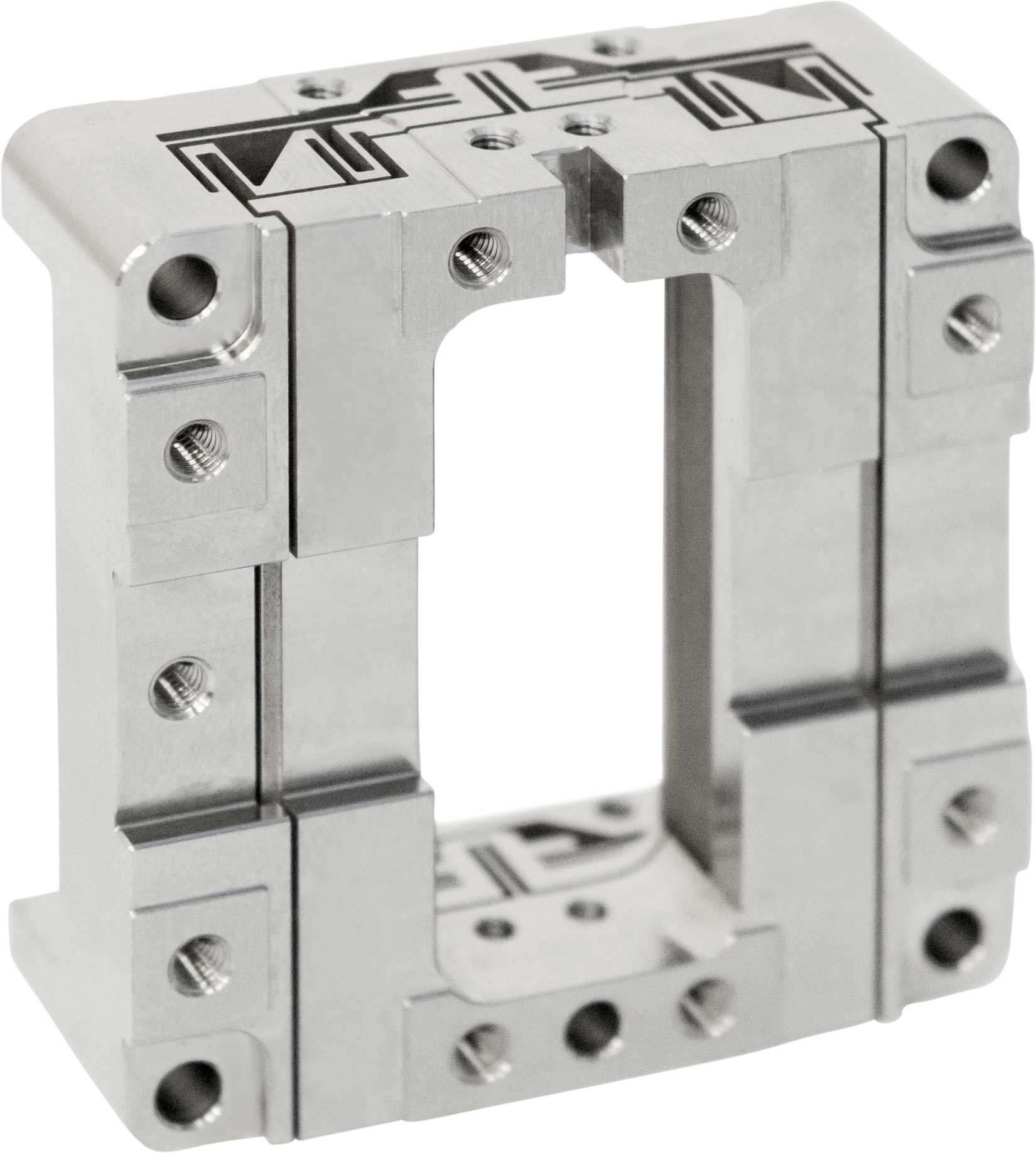
Flexure bearing and spool core
To punctually supply its customers with high-quality and extremely precise components and assemblies, GEWO has a large number of wide-ranging machines at its disposal. The company has to machine a broad spectrum of materials: titanium, stainless steels, various other steels, special alloys such as MU metal, Permenorm, brass and copper as well as plastics and ceramics. In addition to the multitude of CNC machining centres with multi-axis milling machines, numerous CNC lathes, eroding, grinding, polishing and drilling machines as well as saws, there are also various systems for cleaning parts. Turning operations range from the production of precise 0.3 mm bores to reliable turning in diameters of 700 mm. In the milling sector, the company machines components that require a working range of 3000 x 3000 mm and also produces tiny bores in the order of 89 µm. For its spark erosion activities, it has several wire-cutting machines and a die-sinking machine from Mitsubishi Electric. Here, a 6-axis robot supports the production of single parts and small series.
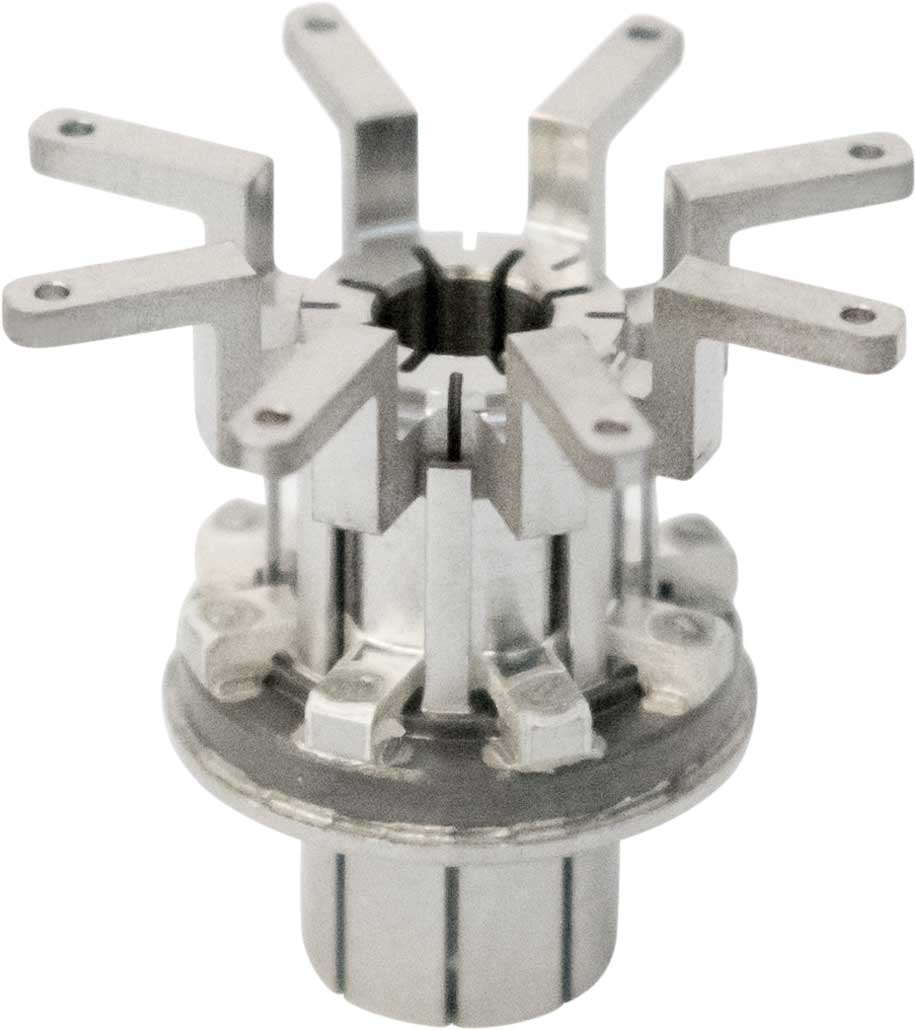
Great entrepreneurial intuition.
The company’s fields of activity also extend to the professional integration of electrical/electronic and pneumatic units and the installation of drives and sensors. ESD (Electro Static Discharge) workstations are available for the fitting of sensitive electronic components. Furthermore, ISO Class 5 cleanrooms facilitate largely dust-free assembly. The quality of cleaning is assured by a variety of cleaning and testing methods such as the water break test, particle measurement and residual gas analysis. In addition to the manufacture of high-precision products, GEWO also invests heavily in quality assurance, which enables it to meet the exacting demands of its customers, particularly in the semiconductor industry.
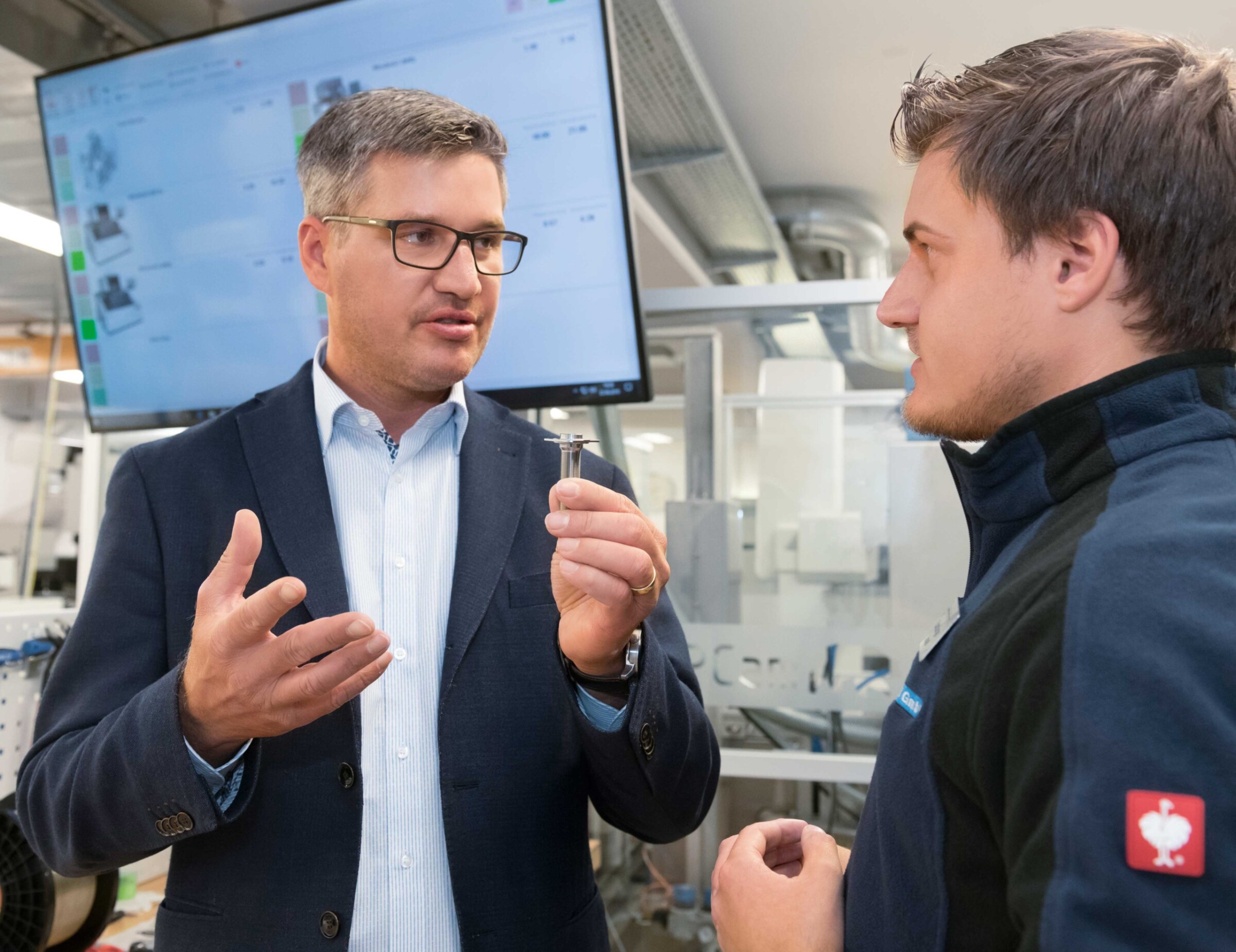
Stefan Woitzik talking to Josef Lanziger
“We used the period during the tense economic situation in 2009 to become more familiar with the possibilities of EDM technology. This was particularly because we had increasingly recognised a growing need for eroding processes. The components concerned are ones with intricate contours, tapers, penetrations, corners and the tiniest radii that require high-precision dimensional accuracy with special surface finishes. This is where EDM has clear advantages over conventional machining,” Stefan Woitzik reports. “Until then, we had outsourced all such tasks. But we are now successfully handling this form of machining ourselves. Nevertheless, some parts are still outsourced.” In 2009, GEWO purchased a total of four FA20S Advance wire EDM systems from Mitsubishi Electric on the strength of their outstanding price/performance ratio. Their capacity utilisation was gradually raised to an effective level. After the generation shift of wire-cutting machines to the MV series, the machine park was supplemented with three MV1200R machines.
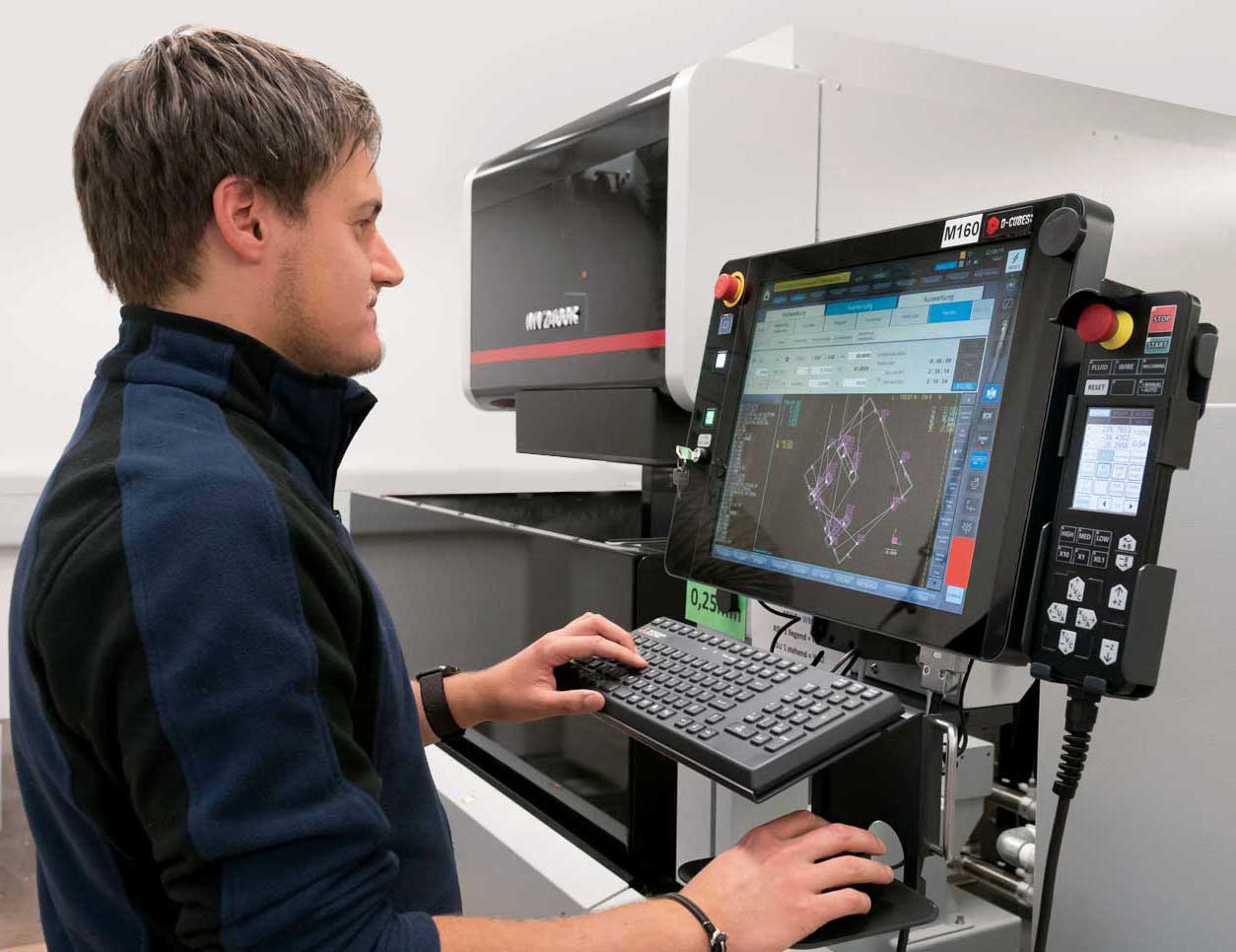
Head of EDM Josef Lanzinger setting up an MV2400
The new generation brought with it significant advances thanks to such additional functions as enhanced machining precision by means of tubular direct drives and further improvements in process reliability, and reductions in machining cycles and energy consumption. Corner precision of ± 1 µm and circular shape deviation of less than 2 µm are now possible. The improved generator performance permits higher productivity. For example, Ra values of 0.45 µm can now be achieved with three cuts and 0.28 µm with four. “In addition, the automatic wire threading already available on the FA20S machines is now noticeably more efficient thanks to an improved parameter setting,” Josef Lanzinger, EDM department manager at GEWO, notes. “In general, wires with diameters of 0.1 to 0.3 mm can be used. But with the new generation we can also use molybdenum wire with diameters of 0.1 to 0.2 mm. These wires are used to prevent copper and zinc contamination of the component.” The MV1200R machines have a work table measuring 640 x 540 mm and can accommodate workpieces with max. dimensions of 810 x 700 x 215 mm and a max. weight of 500 kg. Travel (X, Y, Z) is 400 x 300 x 220 mm.
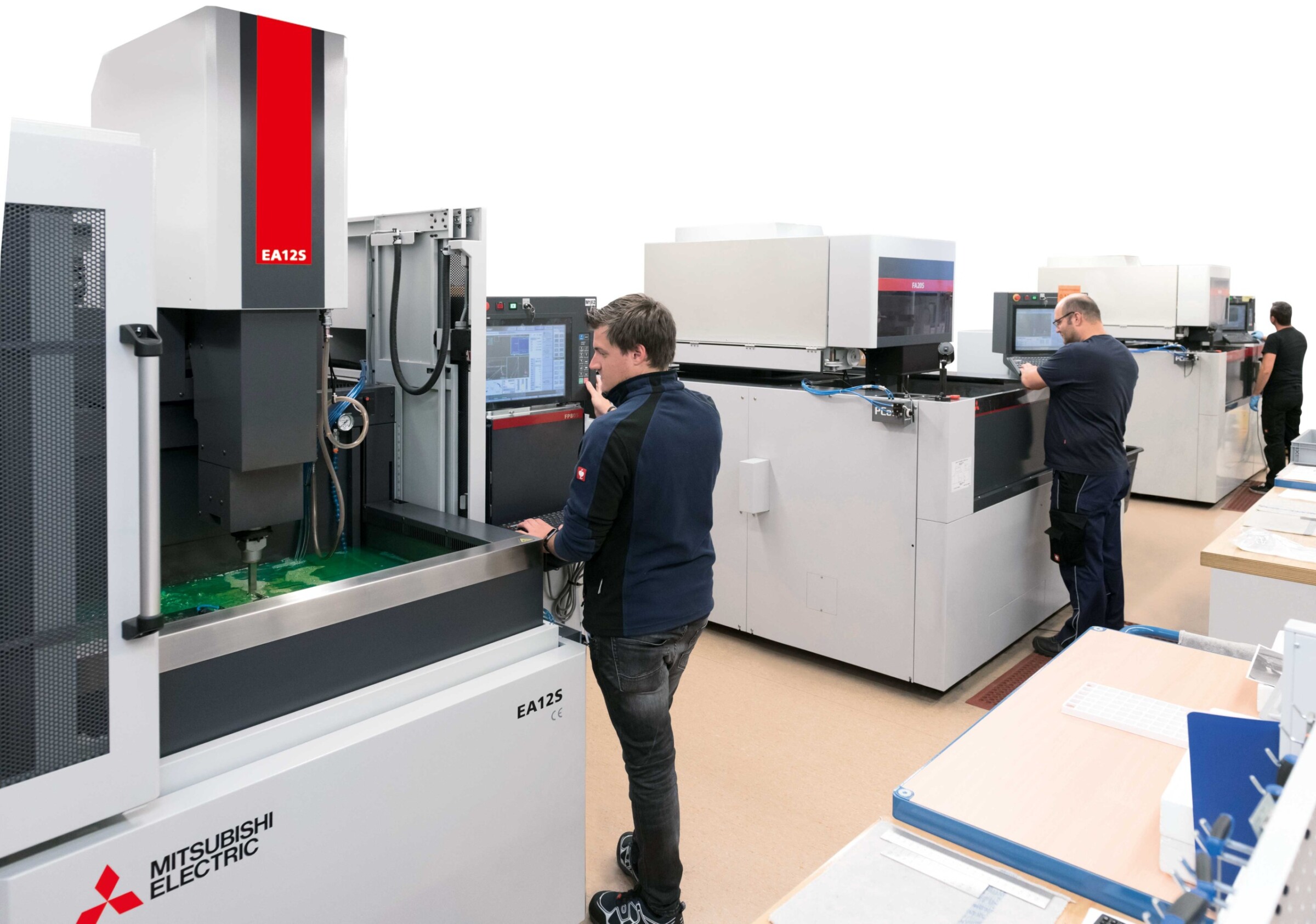
Josef Lanzinger at the EA12S die-sinker
Since 2016, a PCam robot, three MV1200Rs and one FA20S, a coordinate measuring machine and a cleaning system have been operating very impressively in the EDM department. The 6-axis robot loads the various wire EDM machines with blanks and unloads the finished parts as well as manipulating clamping elements from a rotary magazine. It very effectively supports the production of unique and series parts. The automation solution plans jobs, controls processes and activates machines. “With the PCam automation solution and the integration of our ERP system, we can machine components very efficiently on our Mitsubishi EDM machines. Via the plant’s own machine network, the machines receive the required order data, 3D data and the generated NC programs from the CAD/CAM software PCam/Wire,” says Stefan Woitzik, drawing attention to the EDM automation cell. “In line with Industry 4.0, we succeeded in networking all the machines in our company by 2013. This means, for example, that malfunctions such as faulty processes or stoppages can be recorded and reported immediately. This was done initially via the telephone system and later via an SIP client.” These Session Initiation Protocols are based on voice-over-IP. The content is sent in individual data packages via the Internet or intranet.
Great entrepreneurial intuition.
In the event of a malfunction, a message flashes up immediately on the machine display. An additional window provides the operator with a problem analysis as well as information on action to be taken.
Generation change for wire-cutting machines.
Configurable machining parameters can be used to graphically display information on the status and production times of machining operations, as well as the consumption of operating resources and maintenance requirements. In addition, there is an oversized and clearly visible display for the convenient monitoring of all EDM systems. For each machine, a three-colour status indicator lights up in green to indicate that everything is running smoothly or flashes in red to indicate a malfunction. Furthermore, the screen permits the identification of all relevant order data, machining processes, runtimes and production statuses at a glance.
In the wire EDM sector, GEWO was prompted by customer enquiries to conclude that it would have to accommodate larger components, some of which required multiple machinings. So it was an obvious step to take a closer look at the performance profile of the larger Mitsubishi Electric MV2400R machines. These wire EDM machines make it possible to clamp 1050 x 800 x 295 mm components and machine them in the 600 x 400 x 300 mm range. In principle, they offer the familiar range of functions, performance and accustomed operating comfort of the MV1200R. These easily underestimated factors along with the positive experience gained in terms of safety and availability resulted in the installation of two further MV2400R Connect wire EDM systems in 2018.
Significant boost to quality.
The innovative Tubular Shaft Motor drive of all MV wire-cutting systems goes a long way towards enhancing the quality of the machined workpieces. This is because the linear technology employed uses magnetic motors to ensure that the motions of the axes are adapted and completely cogging-free, so responsive control behaviour yields precisely controllable processes and positioning. This in turn results in highly precise wire guidance with clean cuts. The intuitive operation of the wire EDM machines proves to be highly convenient with the Natural User Interface. Operating staff are supported by input masks, 3D views and assistance on the machine’s 19” touch screen. This facilitates workpiece set-up, measuring the workpiece surface using a probe and automatically adapting the angle of the wire to the position of the machined component. Even complicated machining steps can be controlled in 3D.
Significant boost to quality.
An initial interim balance has revealed a reduction in machining times, in operating resources such as erosion wire, deionising resin and filter cartridges, and in energy consumption. If, for example, machining does not take a whole night in an unmanned shift, the machine switches all standby systems to sleep mode on completion. This process complements the already lower energy consumption due to the new generator technology.
In October 2018, the GEWO machine park was extended to include an EA12S die-sinking system from Mitsubishi Electric. It is capable of accommodating components weighing up to 1000 kg with maximum dimensions of 900 x 650 x 350 mm and performing machining operations in the 400 x 300 x 300 mm range. “Although we still had a 40-year-old die-sinking EDM machine at our disposal, it was technologically outmoded and was only taking up space. Although we considered farming out this type of machining, in the end we decided to purchase a new machine for die-sinking EDM. An important requirement was that die-sinking was also very effective in removing seized tapping bits or broken drill bits. In this way, production proper can be resumed without delay,” Lanzinger comments. To boost the productivity and flexibility of the machining sequences on the machine, a 20-fold electrode changer is used. In addition, a C-axis is available, which can be freely programmed for simultaneous operation as well as for rotary operation, while permitting highly precise electrode positioning. For certain requirements, such as deflection, the C-axis makes it possible to position the electrodes exactly at the side. In addition, the same electrode can be used to access the component from different sides.
High aspirations.
“Our investment decisions and expectations of the performance and stability of the eroding machines have been vindicated. This was true of the FA20S and is now also the case with the machines from the MV series and the EA12S. They help to boost our productivity, technological competence and competitiveness, and ultimately savings. Maintenance costs are low and the availability of the eroding machines is very high. Over the years, situations where a machine stopped for unknown reasons overnight or at weekends have arisen perhaps two or three times. But downtime has been minimal,” Stefan Woitzik reflects. “Successful implementation has been assisted by the constructive support of Mitsubishi Electric’s experienced process technicians and engineers. We are very confident about the future. Because with our expertise gained from the constantly new challenges of the European market, we are also well positioned on the global market. “
Lithography optics with extreme ultraviolet light (EUV) already permit the exposure of structures in the order of less than 20 nanometres. Reaching market maturity in 2017, the associated EUV technology opened up a forward-looking market segment for GEWO. This new technology is important for chip manufacturers and users because it benefits home electronics, medical technology, autonomous driving, robotics and artificial intelligence. GEWO Feinmechanik GmbH manufactures precision parts for the semiconductor industry on behalf of Zeiss. For another customer it manufactures electron beam columns for the control of pixel errors in LCD televisions, monitors, notebooks and mobile phones.These are used for the control of pixel errors in LCD televisions, monitors, notebooks and mobile phones.
In 2016, the GEWO 3D division was established for the development and marketing of special 3D printers. These printers are designed for additive manufacturing in the high temperature range of over 200 degrees for plastics such as PEEK. This high-performance material is noted for its chemical resistance, low moisture absorption and high durability and strength. GEWO 3D printing technology enables extremely high reproducibility of the printing process, super-high 3D printing temperatures for the processing of high-performance plastics and up to 10 times the printing speed of similar 3D printers. The 2nd generation of the GEWO 3D printer was unveiled at formnext in Frankfurt in November.
“Admittedly, our training programme in the fields of precision mechanics, mechatronics, information technology, industrial clerks, etc. is not entirely altruistic in its systematic advancement of the young generation in the company. Study coupled with practical experience is also available. In September 2019, we were pleased to admit 24 new trainees,” says Stefan Woitzik, explaining the training offer to encourage continuous growth of the workforce.
“The majority of the trainees stay at the company, with some going on to further training to become master craftsmen or technicians or studying for a bachelor’s degree. We are fortunate in also being able to recruit managers from this group.”
Name and place of company:
GEWO Feinmechanik GmbH
Germany
Founding year:
1981
Employees:
400
Managers:
Stefan Woitzik,
Andreas Woitzik
Core business:
Precision apparatus, optical and machine component manufacturing
GEWO Feinmechanik GmbH
Bahnhofstrasse 23
85457 Wörth-Hörlkofen, Germany
Tel: +49 8122 / 97 48 – 0
Fax: +49 8122 / 97 48 – 21
info@gewo.net
www.gewo.net
II grew up surrounded by metal swarf, because my parents got the business started with their first machines in the cellar and the garage. I have always really enjoyed working with metal.
I started my training as industrial mechanic for devices and precision mechanics after finishing school.
Helping out in my parents’ business before training.
I am always having to deal with new and interesting projects, so I can always learn new things and put myself to the test on a daily basis.
We want to and have to continue to develop so that we can hold our own in the marketplace in terms of price and quality.
Our strengths are our high vertical integration as well as cleaning, residual gas analysis and subsequent cleanroom assembly.
We carefully analyse and evaluate all our projects. This makes it possible to minimise problems and achieve efficient processes with high quality.
It is important to admit to making mistakes and to not conceal anything. It is then easier to correct the mistakes.
Projects are getting bigger and bigger. More employees are therefore involved in the teams, and I delegate more tasks and responsibilities.
With my family and children as well as cycling outdoors and climbing.
Manager
GEWO Feinmechanik GmbH

Stefan Woitzik
Fields marked with a * are mandatory.
Mitsubishi Electric Europe B.V.
German Branch
Mitsubishi-Electric-Platz 1
D - 40882 Ratingen
Sales
Tel.: +49 (0)2102 / 486 - 6120
edm.sales@meg.mee.com
Service
Tel.: +49 (0)2102 / 486 - 7600
edm.hotline@meg.mee.com
Applications
Tel.: +49 (0)2102 / 486 - 7700
edm.applikation@meg.mee.com
Spareparts
Tel.: +49 (0)2102 / 486 - 7500
edm.parts@meg.mee.com